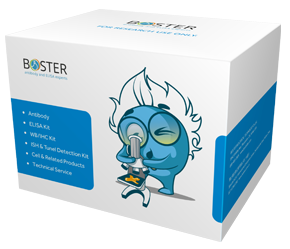Product Info Summary
| SKU: | EKC2031 |
|---|---|
| Size: | 1 kit, containing two 96-well plates and all necessary reagents |
| Reactive Species: | Human, Mouse, Rat |
| Application: | ELISA |
| Sample Types: | Cell lines |
Customers Who Bought This Also Bought
Product info
Product Name
FAK (Phospho-Tyr576) Colorimetric Cell-Based ELISA Kit
SKU/Catalog Number
EKC2031
Size
1 kit, containing two 96-well plates and all necessary reagents
Description
The FAK (Phospho-Tyr576) Cell-Based ELISA Kit is a convenient, lysate-free, high throughput and sensitive assay kit that can monitor FAK (Phospho-Tyr576) protein expression profile in cells. The kit can be used for measuring the relative amounts of FAK (Phospho-Tyr576) in cultured cells as well as screening for the effects that various treatments, inhibitors (ie. siRNA or chemicals), or activators have on FAK (Phospho-Tyr576).
Storage & Handling
Store at 4°C for up to 6 months.
Cite This Product
FAK (Phospho-Tyr576) Colorimetric Cell-Based ELISA Kit (Boster Biological Technology, Pleasanton CA, USA, Catalog # EKC2031)
Clonality of Antibodies
See Datasheet for details
Assay Range
> 5000 cells/well
Reactive Species
EKC2031 is reactive to PTK2 in Human, Mouse, Rat samples
Validated Sample Types
Cell lines
Application Guarantee
EKC2031 is guaranteed for ELISA in Human, Mouse, Rat by Boster Guarantee
See how Boster Bio validate our ELISA kits: ELISA Validation Information
Kit Components
| Reagent | Quantity | Container |
|---|---|---|
| 96-Well Cell Culture Clear-Bottom Microplate | 2 Plates | - |
| 10x TBS | 24 ml (10x) | Clear |
| Quenching Buffer | 24 ml (1x) | Clear |
| Blocking Buffer | 50 ml (1x) | Clear |
| 15x Wash Buffer | 50 ml (15x) | Clear |
| 100x Anti-FAK Phospho-Tyr576 Antibody (Rabbit Polyclonal) | 60 µl (100x) | Red |
| 100x Anti-FAK Antibody (Rabbit Polyclonal) | 60 µl (100x) | Purple |
| 100x Anti-GAPDH Antibody (Mouse Monoclonal) | 60 µl (100x) | Green |
| HRP-Conjugated Anti-Rabbit IgG Antibody | 12ml (1x) | Glass |
| HRP-Conjugated Anti-Mouse IgG Antibody | 12ml (1x) | Glass |
| Primary Antibody Diluent | 12 ml (1x) | Clear |
| Ready-to-Use Substrate | 12 ml (1x) | Brown |
| Stop Solution | 12 ml (1x) | Clear |
| Crystal Violet Solution | 12ml (1x) | Glass |
| SDS Solution | 24 ml (1x) | Clear |
| Adhesive Plate Seals | 2 Seals | - |
*The kit components are not available for individual purchase.
Materials Required But Not Included In Kit
- Microplate reader able to measure absorbance at 450 nm and/or 595 nm for Crystal Violet Cell Staining (Optional)
- Micropipettes with capability of measuring volumes ranging from 1 ul to 1 ml
- 37% formaldehyde (Sigma Cat# F-8775) or formaldehyde from other sources
- Deionized or sterile water
- Squirt bottle, manifold dispenser, multichannel pipette reservoir or automated microplate washer
- Graph paper or computer software capable of generating or displaying logarithmic functions
- Absorbent papers or vacuum aspirator
- Test tubes or microfuge tubes capable of storing 1 ml
- Orbital shaker
- Poly-L-Lysine (Sigma Cat# P4832 for suspension cells)
Data Examples, Quality Control Data

Click image to see more details
Boster Kit Box

Click image to see more details
Western blot analysis of extracts from NIH-3T3 cells
Protein Target Info & Infographic
Gene/Protein Information For PTK2 (Source: Uniprot.Org, NCBI)
Gene Name
PTK2
Full Name
Focal adhesion kinase 1
Weight
119233 MW
Superfamily
protein kinase superfamily
Alternative Names
FADK 1;FAK1;Focal adhesion kinase 1;pp125FAK;Protein- tyrosine kinase 2;PTK2 PTK2 FADK, FAK, FAK1, FRNK, PPP1R71, p125FAK, pp125FAK protein tyrosine kinase 2 focal adhesion kinase 1|FADK 1|FAK-related non-kinase polypeptide|PTK2 protein tyrosine kinase 2|focal adhesion kinase-related nonkinase|protein phosphatase 1 regulatory subunit 71
*if product is indicated to react with multiple species, protein info is based on the gene entry specified above in "species".For more info on PTK2, check out the PTK2 Infographic

We have 30,000+ of these available, one for each gene! check them out.
In this infographic you will see the following information for PTK2: database IDs, super-family, protein function, synonyms, molecular weight, chromosomal locations, tissues of expression, subcellular locations, post translational modifications, and related diseases, research areas & pathways. If you want to see more information included, or would like to contribute to it and be acknowledged, please contact us [email protected].
Specific Publications For FAK (Phospho-Tyr576) Colorimetric Cell-Based ELISA Kit (EKC2031)
Hello CJ!
No publications found for EKC2031
*Do you have publications using this product? Share with us and receive a reward. Ask us for more details.
Recommended Resources
Here are featured tools and databases that you might find useful.
- Boster's Pathways Library
- Protein Databases
- Bioscience Research Protocol Resources
- Data Processing & Analysis Software
- Photo Editing Software
- Scientific Literature Resources
- Research Paper Management Tools
- Molecular Biology Software
- Primer Design Tools
- Bioinformatics Tools
- Phylogenetic Tree Analysis
Customer Reviews
Have you used FAK (Phospho-Tyr576) Colorimetric Cell-Based ELISA Kit?
Submit a review and receive an Amazon gift card.
- $30 for a review with an image
0 Reviews For FAK (Phospho-Tyr576) Colorimetric Cell-Based ELISA Kit
Customer Q&As
Have a question?
Find answers in Q&As, reviews.
Can't find your answer?
Submit your question



